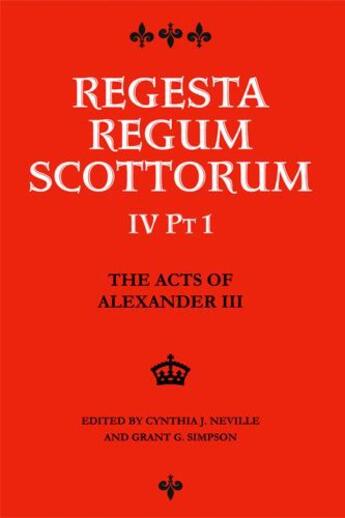-
Nombre de pages : (-)
-
Collection :
(-)
-
Genre :
(-)
-
Thème :
Non attribué
-
Prix littéraire(s) :
(-)
Résumé:
Due to some editorial errors and a missing act, this title is currently being reprinted and all old stock recalled. If you have purchased this title and would like a replacement copy please contact us. Brings together 330 legal documents from the reign of King Alexander III of Scotland. This... Voir plus
Due to some editorial errors and a missing act, this title is currently being reprinted and all old stock recalled. If you have purchased this title and would like a replacement copy please contact us. Brings together 330 legal documents from the reign of King Alexander III of Scotland. This volume contains the full texts of 175 acts issued under the seal of King Alexander III, together with notes on a further 155 "lost acts" that survive only in notices. These acts, many of which have never been published before, have been collected from a variety of archives in Scotland, England, Belgium and France. The Introduction examines the administrative contexts of the later thirteenth century in which the royal chancery drafted and authenticated charters, brieves and other written instruments, and discusses the varied sources from which the collection is compiled. The texts include full Latin transcriptions and detailed English-language summaries of the contents of each act, together with a series of notes and comments on context and significance. By drawing together both original archive sources and widely scattered published sources, the volume offers a unique opportunity to understand how Scottish government and administration operated in the key period before the reign of Robert Bruce. The Regesta Regum Scottorum series has already made available in print a definitive edition of the written acts of several of the medieval kings of Scotland. It remains the standard reference for Scottish, British and European scholars interested in the history of royal chanceries, the evolution of medieval royal government and the growth of literate modes of expression in the Middle Ages.
Donner votre avis














